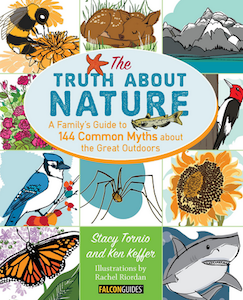Let’s face it: children ask an astonishing number of questions, and children exposed to even a tiny bit of nature ask an exponentially larger number. Parents – or for that matter, grandparents, aunts, uncles, teachers and anyone else with an interest in a child’s overall education and well-being – naturally want to be able to provide them with factual answers, or at least direct them to a reliable source where such answers can be found. The problem is that, when it comes to nature at least, for a large number of adults such answers are not always known for certain and in all-too-many cases a well-circulated myth is unknowingly held to be correct.
The challenge thus becomes how to replace these popular myths about nature with fact-based, easy-to-understand (and remember) answers. To be sure, it’s not an easy challenge to take up, but two who have, Stacy Tornio and Ken Keffer, have recently joined their talents together to produce a book that has the potential to do a great amount of good toward this cause: The Truth About Nature; A Family’s Guide to 144 Common Myths about the Great Outdoors.
Ms. Tornio, the editor of Birds & Blooms magazine, and Mr. Keffer, an experienced biological field technician and nature educator, combine their expertise about the natural world and their talents for down-to-earth, easy-to-understand explanations of it into this exceptionally accessible book that is just the thing for both adults and children alike.
Arranged by season and enlivened with Rachel Riordan’s colorful and welcoming illustrations, The Truth About Nature presents the correct answers to a range of commonly held myths about the natural world. Some of these myths arise from folk sayings; does “April showers bring may flowers” sound familiar? Others are simply the result of common but mistaken knowledge, such as “rabbits love carrots.” Some are even a bit scientific in tone, for instance “birds have no sense of smell.”
One by one, gently and with good humor, Ms. Tornio and Mr. Keffer classify these into three numbered levels (level one being a myth that actually contains more truth than many other similar myths; level three being absolutely false) and then one by one explain why the myth might have come to be, the truth about the matter at hand, a “takeaway” to remember, and finally a few additional interesting facts related to the subject. Each explanation is no longer than a single page and could be read by most older primary school students.
Additionally, interwoven into the text are assorted “Stranger than Fiction,” “Luck Legends,” “Weather Legends,” and “Be a Scientist” pages that enliven the book with a bit of additional nature-oriented commentary and challenge the reader to go just a little bit further in their exploration of the natural world. Thus not only does The Truth About Nature provide a correction to incorrectly held ideas, it provides some additional fresh knowledge intended to spark further investigation as well.
The Truth About Nature is a book that would make an excellent gift for a child, a teacher of children, or most any adult with a child in their life. It is also a superb book for reading together with a child, either on tandem with them or, for those too young to manage some of the words themselves, to them. Indeed, I suspect that many adults who read this book – even those who fancy themselves somewhat familiar with the natural world – will at some point find themselves thinking “Well, I’l be darned…, I didn’t know that.”
 Title: The Truth About Nature; A Family’s Guide to 144 Common Myths about the Great Outdoors
Title: The Truth About Nature; A Family’s Guide to 144 Common Myths about the Great Outdoors
Authors: Stacy Tornio and Ken Keffer, illustrations by Rachel Riordan
Publisher: Falcon Guides
ISBN: 9780762796281
Format: paperback
Pages: 232pp.
Publication Date: : October 2014
In accordance with Federal Trade Commission 16 CFR Part 255, it is disclosed that the copy of the book read in order to produce this review was provided gratis to the reviewer by the publisher.
Nota bene: in celebration of the real ease of The Truth About Nature, Destination Nature is holding a Win a School Visit contest, information about which can be found on the Falcon Guides website.
If you enjoyed reading this, please consider signing up for The Well-read Naturalist's newsletter. You'll receive a helpful list of recently published reviews, short essays, and notes about books in your e-mail inbox once each fortnight.
